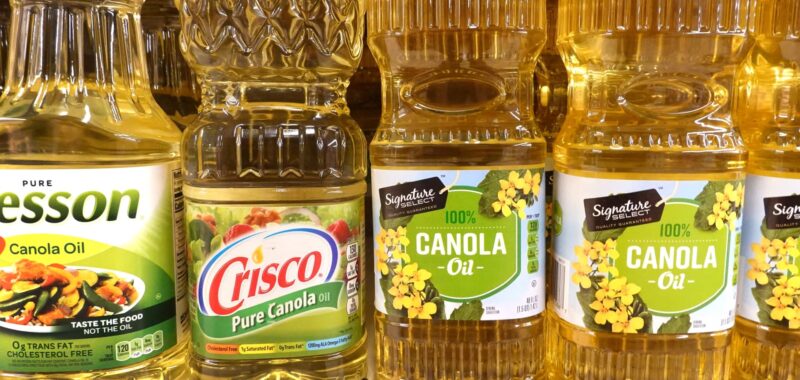Cooking oils made from canola from Canada are offered for sale at a grocery store on April 26, 2022 in Chicago, Illinois.
Scott Olson | Getty Images
China said on Tuesday it planned to start an anti-dumping investigation into canola imports from Canada, after Ottawa moved to impose tariffs on Chinese electric vehicles, lifting prices of domestic rapeseed oil futures to a one-month peak.
Canadian Farm Minister Lawrence MacAulay said the move was “deeply concerning.” In a post on the X social media network, he said Ottawa was closely following the case and would defend and support the farm sector.
Canada, following the lead of the United States and European Union, announced last week a 100% tariff on imports of Chinese electric vehicles and a 25% tariff on imported steel and aluminum from China.
“China strongly deplores and firmly opposes the discriminatory unilateral restrictive measures taken by Canada against its imports from China despite the opposition and dissuasion of many parties,” a commerce ministry spokesperson said in a statement.
The ministry said China will also initiate an anti-dumping investigation into some Canadian chemical products.
More than half of canola produced in Canada makes its way to China, the world’s biggest oilseed importer. Canola, also called rapeseed for certain variants, is used as a cooking oil and in a wide range of products including renewable fuels.
The Canola Council of Canada said it was confident that China’s probe would show that Canadian producers were playing by the rules. In a statement, it said Canadian exports of canola to China last year totaled CA$5.0 billion ($3.7 billion).

China’s rapeseed meal futures on the Zhengzhou Commodity Exchange jumped 6% to 2,375 yuan ($333.56) per metric ton following the announcement, hitting its highest since Aug. 6.
The ICE canola contract for November delivery dropped to its daily limit of $45, or 7%, to $569.7 per metric ton.
“Canada’s canola exports to China have increased significantly and are suspected of dumping, reaching US$3.47 billion in 2023, with a 170% year-on-year increase in volume and a continuous decline in prices,” the ministry said.
“Affected by the unfair competition of the Canadian side, China’s domestic rapeseed-related industries continued to suffer losses,” it said.
China’s rapeseed meal prices have plunged 22% so far this year amid abundant oilseed supply and rising domestic production.
“The current (edible oil) domestic consumption is not strong, and there is an abundant supply of domestic stocks,” said Ma Wenfeng, senior analyst at Beijing-based agriculture consultancy Beijing Orient Agribusiness Consultancy.
China imports its canola predominantly from Canada, followed by Russia and Mongolia.
“Arrivals from Canada have been growing at a fast rate,” Ma said.
The world’s second largest economy imported 5.5 million tons of canola in 2023, valued at $3.72 billion. Imports from Canada accounted for 94% of the total.
Comparatively, the bulk of China’s electric vehicle exports to Canada is from Tesla’s Shanghai factory and local Chinese firms have no big exposure to that export market yet.
Canadian imports of automobiles from China to its largest port, Vancouver, jumped 460% year over year to 44,356 in 2023, when Tesla started shipping Shanghai-made EVs to Canada.
The Chinese spokesperson said it intends to resort to the World Trade Organization dispute settlement mechanism for Canada’s relevant practices.
China has also initiated trade investigations on imports of pork, brandy and dairy from the European Union in response to curbs on its electric vehicle exports.
China had targeted Canadian canola in previous trade tensions. In 2019, it suspended two Canadian canola exporters before removing the restrictions three years later.
Analysts said China could turn to Australia and Ukraine for alternative supplies, especially as Australia’s canola production is ample.
Canola production in Europe has been hit by poor weather while China’s agriculture trade with Ukraine is limited.
“We expect China to buy larger volumes from Australia if restrictions on Australian canola are eased,” said Ole Houe, director of advisory services at IKON Commodities in Sydney.
“As of now Australia’s canola exports to China are negligible, just about 500 tons since the beginning of 2024,” Houe said.
China’s imports of Australian canola have been restricted due to concerns about blackleg disease.

